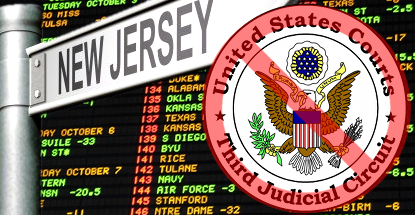 A federal appeals court has rejected New Jersey’s latest attempt to bring legal sports betting to the Garden State.
A federal appeals court has rejected New Jersey’s latest attempt to bring legal sports betting to the Garden State.
On Tuesday, a three-judge panel of the US Third Circuit Court of Appeals ruled 2-1 against New Jersey’s appeal of a lower court’s ruling barring implementation of its latest sports betting legislation. The ruling (read it here) is the second time the Third Circuit has stymied the state’s plans to tear down the 1992 federal PASPA law that restricts legal sports betting to four states, and actual single-game sports betting to within Nevada’s borders.
In 2014, New Jersey passed legislation to repeal state-level prohibitions on sports betting at state racetracks and Atlantic City casinos. The state argued that this plan was fully in line with arguments by their opponents – the US Department of Justice, the four major pro sports leagues and the NCAA – that there was nothing in PASPA that prevented New Jersey from choosing not to enforce PASPA’s edicts so long as it didn’t expressly authorize or license betting operations.
THE RULING
In Tuesday’s majority ruling, Justices Majorie Rendell and Maryanne Trump Barry said the “specific permission and empowerment” granted to casinos and racetracks amounted to “authorization” of an activity that PASPA had “clearly and completely legally prohibited.” The justices went on to say that “clever drafting or mandatory construction provisions” should not be used “to escape the supremacy of federal law.”
The justices noted that PASPA had given New Jersey a one-year window in which to pass legislation allowing sports betting at its casinos, which the state failed to do. The justices therefore concluded that, “if sports gambling in New Jersey’s casinos does not violate PASPA, then PASPA’s one-year exception for New Jersey would have been superfluous.”
The justices also slapped down efforts to permit New Jersey to offer betting on sports other than the ones controlled by the state’s legal opponents.
The court also rejected New Jersey’s claims that the opposing leagues had “unclean hands” because the NFL holds games in London, where betting is allowed, and due to the leagues’ ever-tighter embrace of daily fantasy sports operators (who are the primary beneficiaries of Tuesday’s ruling). Such allegations “fail to rise to the level required for application of the unclean hands doctrine.”
The justices saluted New Jersey’s “salutary” desire to give a boost to its struggling casino and racing industries and noted that “PASPA’s provisions and its reach are controversial, and, some might say, unwise.” However, the court is “duty-bound to interpret the text of the law as Congress wrote it.”
FUENTES’ DISSENT
In his dissenting opinion, Justice Julio Fuentes said his fellow justices had failed to illustrate how New Jersey’s latest law “results in sports wagering when there is no law in place … and no state involvement.”
The irony factor here is high, given that Fuentes penned the 2013 majority opinion that rejected New Jersey’s previous effort to legalize sports betting. In Tuesday’s dissent, Fuentes said the majority’s argument that a partial repeal amounts to authorization “rests on the same false equivalence” the court rejected in its 2013 smackdown.
Fuentes said Tuesday’s ruling had left New Jersey with “no choice at all – it must uphold all prohibitions on sports wagering in perpetuity or until PASPA is no more. This is precisely the opposite of what we held in Christie I – “[n}othing in these words requires that the states keep any law in place” – and why we found PASPA did not violate the anti-commandeering principle” of the US Constitution.
REACTIONS
In response to the news, New Jersey State Sen. Ray Lesniak tweeted that Fuentes had “got it right in his dissent.” As expected, Lesniak said the state would appeal the ruling to the full Third Circuit court, although the state was unsuccessful in its last attempt to win a full Third Circuit Court re-hearing of its 2013 three-judge panel defeat. The state also failed to convince the US Supreme Court to hear the case.
The American Gaming Association (AGA) issued a tepid statement saying the ruling “encourages deeper examination about the best path forward on this issue.” The AGA noted that the scale of the illegal sports betting business in the US made it clear that PASPA has failed to achieve its stated aims and that the AGA was in the process of studying ways to bring sports betting in from the cold.
The NFL declined to comment, with spokesman Greg Aiello saying that the decision “speaks for itself.”






